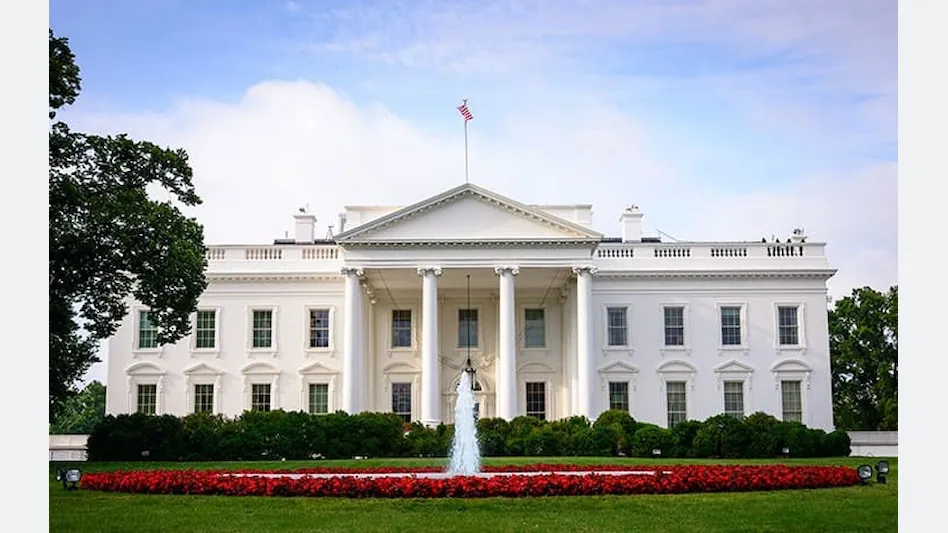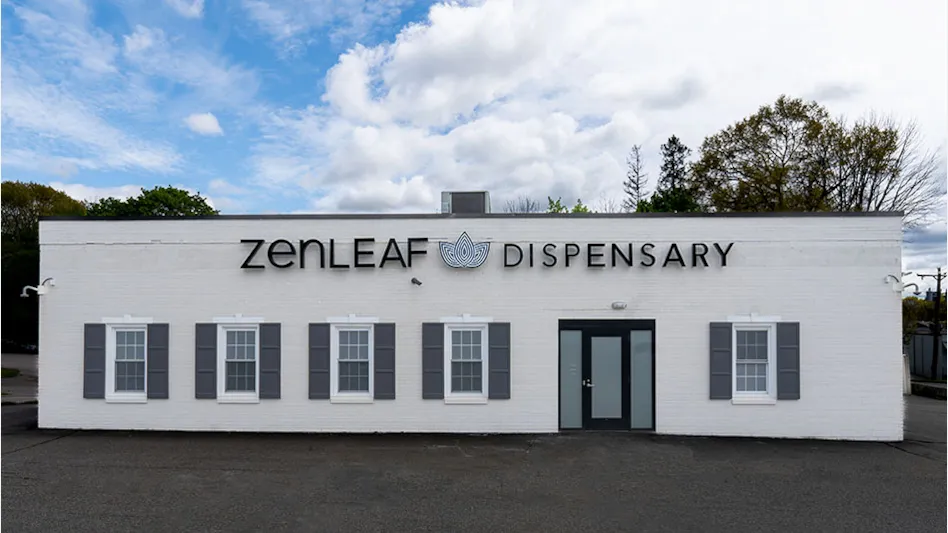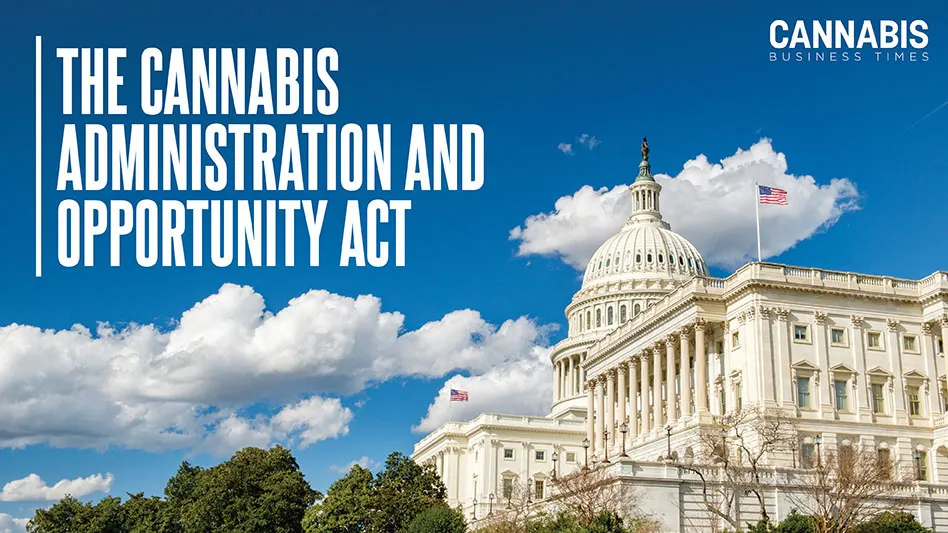
Zack Frank | Adobe Stock
Editor's note: This story was originally published on Sept. 28, 2020. On Nov. 7, the election was called in Joe Biden's favor.
With just over 30 days until Election Day, the cannabis industry is surely wondering what impact the results of the 2020 election could have on cannabis policy reform efforts, particularly when it comes to the presidential race between Donald Trump and Joe Biden.
“The industry has two choices, like the rest of the country—more of the same or change,” Mark Alderman, chairman of Cozen O’Connor Public Strategies, tells Cannabis Business Times and Cannabis Dispensary. “More of the same looks like where we are now [with Trump] in the White House and [Majority Leader Mitch] McConnell in the Senate. As we’ve seen in the past four years and as I would expect to see the next four years if they win, … the prospects for federal action on cannabis would be minimal.”
As far as Biden, while the former vice president was largely a prohibitionist during his time as a senator, some industry stakeholders say that he, like much of the American public, has evolved quite a bit on the issue since then.
“Biden’s history as a senator, by and large, was pretty terrible on this issue,” says Kris Krane, founder and president of 4Front Ventures, the parent company of Mission Dispensaries. “When I was working professionally in Washington, D.C. on the reform side of this issue, we had two major opponents on the Democratic side of the aisle and that was Dianne Feinstein and Joe Biden. He was always a drug warrior. He was never supportive of reform. He was arguably one of the worst Democrats in the Senate on this issue, so it gives me a little bit of pause about him being a real advocate for any kind of reform, given that he’s always been a pretty staunch prohibitionist.”
Still, Krane acknowledges that Biden now supports decriminalization and expungement, as well as allowing states to set their own cannabis policies.
“The only problem with that is that’s effectively Barack Obama’s position in 2008,” Krane says. “The Democratic party has moved so far on this issue since then. It’s actually a fairly untenable position, I would argue, for a Democratic standard bearer here in 2020.”
Jonathan Havens, co-chair of the Cannabis Law Practice and Food and Beverage Practice at Saul Ewing Arnstein & Lehr, echoes a similar sentiment.
“I think the country has evolved on cannabis,” he says, adding that it is encouraging that Biden has also evolved to support decriminalization and expungement, although he still does not support adult-use legalization.
Steve Hawkins, executive director for the Marijuana Policy Project (MPP), says that while Biden had a hand in creating tough drug policies as a senator in the ’90s, he has since evolved from a diehard prohibitionist to understanding that the war on drugs has had a devastating, and perhaps unfair, impact on people’s lives.
“I don’t think, though, that that’s the end of his journey,” Hawkins says. “I think that a President Biden will be hearing from people of his own cabinet [and] from constituents on the examination of where public attitudes are now, where 67% of the American people—two-thirds—believe that cannabis should be legalized.”
Biden seems open minded on the issue, Hawkins adds, and stands to be persuaded to support major steps toward policy reform, such as the Secure and Fair Enforcement (SAFE) Banking Act and the Marijuana Opportunity, Reinvestment and Expungement (MORE) Act, both of which are pending in Congress.
Cannabis on the Campaign Trail
Cannabis policy has hardly been a focal point in this election cycle, with the ongoing COVID-19 pandemic and the issue of police brutality understandably taking precedence.
While Hawkins does not expect cannabis to be discussed during the upcoming presidential debates, he finds it encouraging that it was mentioned during the Democratic primary debates.
“I think the fact that maybe nine out of the 11 major contenders in the primary were all supportive of cannabis legalization demonstrates that this is not a fringe issue at all in terms of at least the Democratic party, but that it is an issue that has really reached the mainstream consensus,” he says.
However, earlier this year, the Democratic party rejected putting a plank in their platform supporting cannabis legalization, despite the issue being widely supported among Democratic officials.
“That was pretty disappointing,” Krane says. “I think the reason they did that is a nod to the fact that Biden and his policy position aren’t there yet, and they didn’t want to put something in their platform that their standard bearer doesn’t support.”
The silver lining, Krane says, is Biden’s vice president pick, Sen. Kamala Harris, who is the lead sponsor of the MORE Act in the Senate and could be a positive force for policy reform within a Biden administration.
“Despite her own spotty record as a prosecutor, she’s been one of the better senators … on this issue in general [and] has spoken out very forcefully on the need to legalize,” Krane says.
With Harris’ support, some changes at the executive level could be possible, he says. Biden could instruct the IRS to reinterpret 280E to exclude state-legal cannabis businesses, for example, or he could order the Department of Justice to expunge the records of anyone with a cannabis conviction. He could also issue a memo with the Treasury Department to re-write banking rules for the industry, Krane adds.
“I think when it comes to decriminalization and … expungements for cannabis-related convictions, a Biden-Harris presidency and vice presidency will be helpful, and … legalization [of] medical [cannabis] potentially will occur,” Havens says. “But I still think … if Biden gets elected, we’re not going to see broad-scale federal legalization quickly.”
Still, Hawkins says that Harris will be key in advancing cannabis policy reform efforts, particularly when it comes to criminal justice reform.
“I think her role is tremendously important in terms of convincing a President Biden that cannabis should be descheduled,” he says. “I think … Sen. Harris … understands that while decriminalization is incredibly important, it is insufficient. We have to be able to have a regulated market for a host of reasons—public safety being one. But also, if we want to see the changes in law enforcement, … we’re not going to see the dramatic decrease in cannabis arrests until we see legalization.”
Alderman also believes that Harris will help lead the charge for major reform efforts.
“I think she is going to have a prominent advisory role with the president, and I think cannabis will be her portfolio,” he says. “I think her charge will be to get it decriminalized, to get criminal records expunged, to get research done ASAP and to move toward legalization after more study. I think she is likely to lead that entire effort in a unified Democratic government. It’s a great project for her.”
Shifting Dynamics in Congress
Regardless of who wins the presidential race, industry stakeholders seem to agree that any major cannabis policy reform efforts largely depend on how the election changes the makeup of Congress.
“I think even if the Republicans hold the Senate, we may see something like SAFE Banking passed,” Krane says. “If the Democrats take the Senate and hold the House and Biden wins the White House, then I think there’s a real chance for significant reform, potentially further than just banking reform. We could be looking at something like the MORE Act [with] full federal descheduling.”
Alderman agrees that a Biden administration and a Democratic-controlled Senate would bring major action on cannabis reform.
“I think what you’ll see is, maybe even on day one, an executive order from President Biden decriminalizing cannabis and ordering more study,” he says. “I think you’ll see legislation that does the same, and then we’ll have two years to get enough research done to satisfy President Biden that it’s time to legalize. I think he gets there, and I think the industry gets there, but it’s got to happen in the first two years because then you’re in a new world after a midterm election.”
If, however, Republicans maintain control of the Senate and McConnell remains the majority leader, Havens says the cannabis industry will have many of the same legislative challenges that are present today.
“For example, … SAFE Banking passed the House,” he says. “It hasn’t even been calendared for a vote in the Senate. As long as Mitch McConnell is majority leader, I don’t see that changing. The MORE Act is a little bit different. The House said it would vote on it, but it’s been delayed presumably until after the election. But even if it passed the House, I think it would be treated the same way in the Senate as the SAFE Banking Act. Unless it’s scheduled for a vote, it’s kind of hard to pass it and sign it into law.”
Alderman echoes these concerns.
“There’s no commitment on the part of the White House, the Senate Majority Leader or the Republican caucus in the Senate to move on the issue,” he says. “I think you will see the MORE Act … sent to the Senate by the House after the election. … It’ll get sent to the Senate, it will of course go nowhere and that’s where I think the industry is likely to be for four more years in a Trump-McConnell world.”
Although Biden seems receptive to decriminalization and even medical cannabis legalization, Havens says without Congress, no meaningful reform can be accomplished, although the tides are beginning to shift as more states legalize medical and adult-use cannabis.
Five states—Arizona, Mississippi, Montana, New Jersey and South Dakota—will vote on ballot initiatives to legalize some form of cannabis this year, which Hawkins says could tip the scales and rally more support for cannabis policy reform efforts in Congress.
“South Dakota … is a deep red state, which no one is expecting Biden to win, but [if] the voting public there will vote in favor of cannabis legalization, [it] says something about how cannabis is now widely acceptable across the political spectrum,” he says. “I think that … has influenced Congress and will continue to influence the next administration.”
Congress is currently having discussions about the SAFE Banking Act and the MORE Act precisely because 11 state have legalized adult-use and more than 30 others have implemented regulated medical cannabis programs, Hawkins adds, and the momentum will continue to build.
“It’s that kind of changing attitude at the state level that is ultimately informing what happens at the federal level,” he says. “What we’ve seen with Cory Gardner and the senators from Alaska is that when you now are in a state where the constituents have voted for cannabis legalization, where there are the beginnings of business and industry coming into formation and there are jobs and revenue and opportunity, people understand that their role is to become advocates for cannabis.
“That … will deeply inform how the next Congress looks at cannabis. Yes, the races that are going on and the makeup of the House and Senate play a critical role, but also, it’s important to how the senators and members of the House will vote—it’s what they see happening back in their home state and in the country.”
If the nation wakes up on Nov. 4 with Arizona, Mississippi, Montana, New Jersey and South Dakota all voting in favor of their cannabis legalization initiatives, a wide majority of Americans will live in jurisdictions where medical or adult-use cannabis, or both, is accepted.
Beyond that, as we head into 2021, Hawkins says that more states are likely to consider legalization to combat the economic fallout of the COVID-19 pandemic.
“Every state in the country is experiencing massive budget deficits as a result of the COVID virus,” he says. “They are not going to make up those deficits overnight, and they’re looking to other ways to bring resources into the coffers. That’s led to open discussions about whether cannabis should be legalized to reap the tax revenue as well as the job creation that comes with it, as well as the stimulation of local economies with ancillary businesses and so forth.”
“With all of that going on, I think a Biden administration would see a number of states it cares about legalizing in the early months of 2021, and that is only going to add to the momentum,” Alderman adds.
Assessing the Overall Outlook
Even with so many states considering legalization, both during the election and next year’s legislative sessions, Havens cautions that any sort of change—especially at the federal level—will take time, no matter what the election results.
“Our cannabis policies have been the same for decades now,” he says. “It takes a long time to move a big, rusty, creaky ship in a different direction, and that’s how we should view our drug policies. It takes a long time to move our policies in a different direction. I certainly don’t want to understate the importance. Biden and Harris have come out much more strongly in favor of cannabis than Trump-Pence—100 times stronger. But I do think some, especially in the cannabis reform community, would say that’s great, but it’s not far enough, that there would still be restrictions and it would only be for medical and you would still need states to act until Congress gets involved.”
And when that day finally comes and Congress does approve some form of cannabis policy reform, industry stakeholders seem divided over what a President Biden might ultimately sign into law.
“Everybody around Joe Biden is in favor of cannabis legalization, but Joe Biden is not,” Alderman says. “It’ll get very interesting if we find ourselves in a Biden administration with a Democratic-controlled Senate because the question will be whether [Nancy] Pelosi and [Chuck] Schumer, as Speaker [of the House] and [potentially Senate] Majority Leader, are prepared to send to President Biden a legalization bill that he’s really not ready for. I think not.”
Krane, on the other hand, says it is unlikely that Biden would ultimately veto a bill to deschedule or federally legalize cannabis.
“I don’t see him taking on his party on an issue like this,” he says. “I think if the Democrats have the unified government come next year, there’s a significant chance that we see very meaningful reform at the federal level."
Latest from Cannabis Business Times
- South Dakota Group Submits 29K Signatures for 2024 Adult-Use Cannabis Legalization Measure
- Rescheduling Would Have Saved Verano $80M in 2023 Tax Payments, CEO Says
- Aurora Marks 1st Medical Cannabis Shipment to New Zealand Market
- Where All 100 US Senators Stand on SAFER Banking Act
- Blumenauer Unveils Legislative Blueprint, Additional Administrative Action Needed Following Rescheduling
- Cannabis Rescheduling FAQ: What Now?
- From Custodian to Cultivation Supervisor
- California City in Cannabis Retail Desert Welcomes 1st Dispensary





